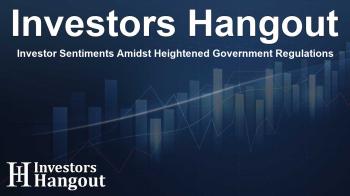Investor Sentiments Amidst Heightened Government Regulations

Concerns Surge Over Government's Financial Oversight
Recently, a lively discussion emerged on a popular investment forum, drawing the attention of many regarding the recent executive orders from the current administration. Investors are expressing worries related to increased governmental influence over key financial agencies such as the Securities and Exchange Commission (SEC) and the Federal Trade Commission (FTC). Many believe that this newfound power could compromise the independence of these regulatory bodies and ultimately affect market integrity.
Understanding the Implications of Executive Orders
The latest executive orders have shifted the oversight dynamics, compelling regulatory agencies to report to the White House. This underlines a major concern about the potential intertwining of politics with crucial financial regulations, as the SEC and FTC play vital roles in enforcing compliance and maintaining a fair marketplace. Investors fear that if these agencies lack independence, we might witness diminished regulatory enforcement, increased favoritism, and unwanted market fluctuations.
To Invest or Not to Invest?
Apost from the investment community posed a thought-provoking question: “Are you feeling uneasy about investing given the current executive orders?” Many echoed a similar sentiment, indicating a drastic change in their investment strategies. Some contemplated liquidating portions of their assets due to uncertainty, while others proposed a more cautious approach, recommending that investors hold cash reserves for potential market dips.
Discussions revealed varying opinions. While some investors feel secure by maintaining a larger cash position, others raised concerns about inflation eroding the value of cash over time, prompting a delicate balancing act between liquidity and investment opportunities.
Diversifying Investment Strategies
As worries about the U.S. market grow, a growing number of investors are seeking refuge in international markets. They are looking into sectors such as cybersecurity and defense, as well as global mutual funds. Additionally, multi-currency accounts are gaining traction amid fears about the long-term stability of the U.S. dollar amidst fluctuating international economic conditions.
The potential impact of rising tariffs and supply chain issues cannot be overlooked, either. These factors could contribute to inflation, creating a tumultuous environment for both consumers and investors alike. Some speculate that if the Federal Reserve opts to maintain high interest rates, it further destabilizes market sentiment.
A Concerning Shift in Authority
Wider implications of recent executive directives have raised eyebrows. Other orders have led to substantial changes in how oversight bodies function, signaling possible extensions of presidential powers that could ultimately reshape the political landscape. Legal scholars urge caution, arguing that the broader implications of such power consolidation could set concerning precedents for future governance.
Preparing for Uncertainty
As the market navigates through unclear waters, the real challenge lies in how investors choose to adapt. Maintaining a long-term view is vital, yet the rising tide of uncertainty makes many question their investment strategies. While some view the current market fluctuations as a buying opportunity, others are wary of the risks posed by reduced regulatory scrutiny and its consequences on market stability.
Frequently Asked Questions
What is the main concern related to the executive orders?
Investors worry that the executive orders give the government more control over regulatory agencies, which could undermine their independence and affect market fairness.
How are investors responding to the current market situation?
Some investors are considering pulling out investments, while others propose maintaining cash reserves to protect against potential market declines.
What sectors are investors looking at for diversification?
Many are exploring industries outside of the U.S., particularly in cybersecurity, defense, and international mutual funds.
What risks do high-interest rates pose to the market?
High-interest rates could lead to reduced consumer spending, driving inflation, and consequently shaking investor confidence in the market.
How should investors approach their strategy amidst uncertainty?
It is crucial for investors to assess their risk tolerance, balancing between holding cash as a safety net and taking advantage of investment opportunities.
About The Author
Contact Dylan Bailey privately here. Or send an email with ATTN: Dylan Bailey as the subject to contact@investorshangout.com.
About Investors Hangout
Investors Hangout is a leading online stock forum for financial discussion and learning, offering a wide range of free tools and resources. It draws in traders of all levels, who exchange market knowledge, investigate trading tactics, and keep an eye on industry developments in real time. Featuring financial articles, stock message boards, quotes, charts, company profiles, and live news updates. Through cooperative learning and a wealth of informational resources, it helps users from novices creating their first portfolios to experts honing their techniques. Join Investors Hangout today: https://investorshangout.com/
The content of this article is based on factual, publicly available information and does not represent legal, financial, or investment advice. Investors Hangout does not offer financial advice, and the author is not a licensed financial advisor. Consult a qualified advisor before making any financial or investment decisions based on this article. This article should not be considered advice to purchase, sell, or hold any securities or other investments. If any of the material provided here is inaccurate, please contact us for corrections.

